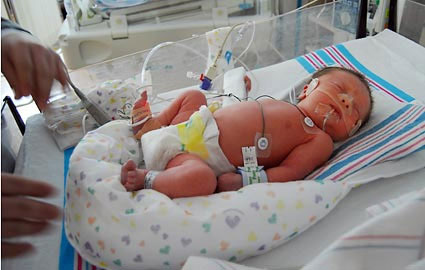Miscarriages are heart wrenching experiences. The pain of a miscarriage may never go but understanding it can help you deal better with future pregnancies. Suparna had shared the news of her pregnancy with her husband just a week before she had a miscarriage. Suparna had no idea why it happened to her and was devastated with the entire experience. The heartbroken couple felt hopeless. Suparna kept thinking where did she go wrong? She kept blaming herself and would get irritated on the smallest of issues. Her husband tried out many things to take her mind off themiscarriage, but in vain. He did not know that the most important thing for them was to understand a miscarriage better. Only if they understood what went going wrong and why, they would be in a better position to handle the situation. Miscarriages can be a rude shock to couples. It is not easy to get over it and it is very difficult to avoid getting stressed thinking about it. The next time you are pregnant, everyday seems long. You just wish the months to pass quickly without any harm done to your unborn baby.Understanding a miscarriage can help you relieve some anxiety and you will be more aware about your body. One out of every four women may experience a miscarriage. Staying informed may help in being prepared for the future. In this articleWhat is a miscarriage?How do miscarriages occur?What causes a Miscarriage?Who is at risk?Symptoms of a miscarriageCan miscarriages be prevented?Recovering from Miscarriage What is a miscarriage? A miscarriage is the loss of the foetus before it is born. Most miscarriages occur in the first trimester. There is minimal chance of a miscarriage during the third trimester. After 28th week it is considered as premature labour. How do miscarriages occur? Most women do not even know if a miscarriage has occurred during early pregnancy. It might just feel like it is a late period. Some women may experience cramping in lower abdomen and back pain with vaginal bleeding. Sometimes a miscarriage may be discovered during an ultrasound scan when the heartbeat of the foetus cannot be detected. What causes a Miscarriage? Age and health play a vital role in the occurrence of miscarriages. Most miscarriages occur due to chromosomal deformities. Conditions like infection, uncontrolled gestational diabetes, excess water retention, weak uterus, fibroids or cervix related problems can cause miscarriages. Who is at risk? Although a miscarriage can happen to anyone, there are certain things a mother should take care of. For example, excessive consumption of caffeine, consuming alcohol, smoking, women suffering with diabetes, thyroid or other infections, too many invasive prenatal tests, previous miscarriages, uterine or cervical problems can increase the risk of amiscarriage. Women over the age of 35, women with multiple pregnancies and women who have undergone hormonal treatments are also at risk. Symptoms of a miscarriage Most miscarriages occur before the 20th week of pregnancy. Here are the common symptoms that should set your alarm bells ringing. Vaginal bleeding. Although spotting and bleeding is fairly common in early pregnancy, check with your doctor Cramps or pain in lower abdomen (often worse than menstrual cramps) Pain in lower back Passing blood clot through vagina Decrease in signs of pregnancy Sudden weight loss A white-pinkish vaginal discharge Can miscarriages be prevented? There is not much that one can do to prevent a miscarriage but ensuring that you are healthy can help. Focus on staying healthy even before you conceive. Seek prenatal advice from your doctor. If you are over 35 you should take care on every step of your pregnancy. Here are a few ways thatcan help you remain healthy and plan a healthy pregnancy. Eat a balanced diet Exercise regularly Avoid stress Meditate to get some mental peace Relax and rejuvenate Get some sound sleep Quit smoking and drinking Avoid coffee and tea. Choose milk or juices Avoid taking random pills for headache. Get a warm oil massage done instead Follow your gynecologists instructions religiously Recovering from Miscarriage Physical recovery from miscarriages may take a few hours but it is the emotional recovery that may take some time. Blaming yourself and feeling guilty will not solve the problem. Seek help on coping with your miscarriage. It may seem difficult, but be brave. Give the wounds some time to heal. Take support from your partner. Communicate to someone close to you about whatever you feel and let your emotions flow out. You may record what you feel in a diary or create a special space on the internet for yourself and find people who have gone through a similarexperience. You may have heard it a million times but once again, time is the best healer. You can try again for a baby with your doctors advice. He may ask you to wait for at least one menstrual cycle. All you have to ensure is that you are physically and emotionally ready for getting pregnant. Once you have understood a miscarriage better and observed that many other women have gone through it, you will be able to accept the problem and deal with yourself. Try not to get depressed. Always remember a miscarriage is natures way to ensure that you have a healthy child.
Miscarriages are heart wrenching experiences. The pain of a miscarriage may never go but understanding it can help you deal better with future pregnancies. Suparna had shared the news of her
pregnancy with her husband just a week before she had a miscarriage. Suparna had no idea why it happened to her and was devastated with the entire experience. The heartbroken couple felt hopeless. Suparna kept thinking where did she go wrong? She kept blaming herself and would get irritated on the smallest of issues. Her husband tried out many things to take her mind off themiscarriage, but in vain. He did not know that the most important thing for them was to understand a miscarriage better. Only if they understood what went going wrong and why, they would be in a better position to handle the situation.
Miscarriages can be a rude shock to couples. It is not easy to get over it and it is very difficult to avoid getting
stressed thinking about it. The next time you are pregnant, everyday seems long. You just wish the months to pass quickly without any harm done to your unborn baby.Understanding a miscarriage can help you relieve some anxiety and you will be more aware about your body. One out of every four women may experience a miscarriage. Staying informed may help in being prepared for the
future.
What is a miscarriage?
A miscarriage is the loss of the foetus before it is born. Most miscarriages occur in the first trimester. There is minimal chance of a miscarriage during the third trimester. After 28th week it is considered as
premature labour.
How do miscarriages occur?
Most women do not even know if a miscarriage has occurred during early pregnancy. It might just feel like it is a late period. Some women may experience cramping in lower abdomen and back pain with vaginal bleeding. Sometimes a miscarriage may be discovered during an
ultrasound scan when the heartbeat of the foetus cannot be detected.
What causes a Miscarriage?
Age and health play a vital role in the occurrence of miscarriages. Most miscarriages occur due to chromosomal deformities. Conditions like infection, uncontrolled gestational
diabetes, excess water retention, weak uterus, fibroids or cervix related problems can cause miscarriages.
Who is at risk?
Although a miscarriage can happen to anyone, there are certain things a mother should take care of. For example, excessive consumption of
caffeine, consuming alcohol, smoking, women suffering with diabetes, thyroid or other infections, too many invasive prenatal tests, previous miscarriages, uterine or cervical problems can increase the risk of amiscarriage. Women over the age of 35, women with
multiple pregnancies and women who have undergone hormonal treatments are also at risk.
Symptoms of a miscarriage
Most miscarriages occur before the 20th week of
pregnancy. Here are the common symptoms that should set your
alarm bells ringing.
- Vaginal bleeding. Although spotting and bleeding is fairly common in early pregnancy, check with your doctor
- Cramps or pain in lower abdomen (often worse than menstrual cramps)
- Pain in lower back
- Passing blood clot through vagina
- Decrease in signs of pregnancy
- Sudden weight loss
- A white-pinkish vaginal discharge
Can miscarriages be prevented?
There is not much that one can do to prevent a miscarriage but ensuring that you are
healthy can help. Focus on staying healthy even before you
conceive. Seek prenatal advice from your doctor. If you are over 35 you should take care on every step of your pregnancy. Here are a few ways thatcan help you remain healthy and plan a
healthy pregnancy.
- Eat a balanced diet
- Exercise regularly
- Avoid stress
- Meditate to get some mental peace
- Relax and rejuvenate
- Get some sound sleep
- Quit smoking and drinking
- Avoid coffee and tea. Choose milk or juices
- Avoid taking random pills for headache. Get a warm oil massage done instead
- Follow your gynecologist's instructions religiously
Recovering from Miscarriage
Physical recovery from
miscarriages may take a few hours but it is the emotional recovery that may take some time. Blaming yourself and feeling guilty will not solve the problem. Seek help on
coping with your miscarriage. It may seem difficult, but be brave. Give the wounds some time to heal. Take support from your partner. Communicate to someone close to you about whatever you feel and let your emotions flow out. You may record what you feel in a diary or create a special space on the internet for yourself and find people who have gone through a similarexperience. You may have heard it a million times but once again, time is the best healer.
You can
try again for a baby with your doctor's advice. He may ask you to wait for at least one
menstrual cycle. All you have to ensure is that you are physically and emotionally ready for getting pregnant.
Once you have understood a miscarriage better and observed that many other women have gone through it, you will be able to accept the problem and deal with yourself. Try not to get
depressed. Always remember a miscarriage is nature's way to ensure that you have a healthy child.
































